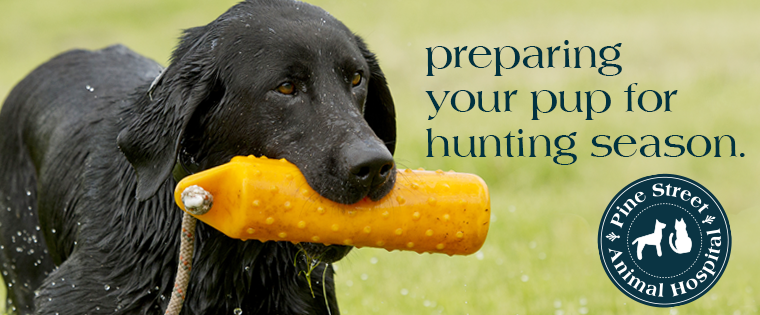The days are getting shorter, the nights are getting longer, the humidity is dropping and the air is finally crisp. We gun-dog owners have been dreaming of this since March: hunting season is finally upon us!
Gun dog breeds are a special lot. During the off season, they pull duty as companions and guard dogs. But when the heat dissipates and the wind swings down from the north, it’s time to get to work and pay the rent. But as with any change in activities, you need to do a few steps of preparation first.
Here are some steps you can take to ensure your gun dog is ready for the hunt and stays safe while participating in this labor of love.
- Start healthy. Before you think about setting your dog to work, make sure she’s in prime, healthy condition. Preparation begins in the off season with seeing your vet for health screenings, conditioning and up-to-date vaccinations (learn more about dog vaccines). Treat any problems early so your dog will be fully prepared to take to the fields.
- Adjust feeding as needed. Nutrition requirements change as your dog’s work load increases. Most gun dogs will start to shed some weight during the season and will therefore need additional calories to maintain a healthy weight. Switching to a performance formula will help add the additional calories they need to stay energized (find reviews of performance dog foods here and here). Foods higher in protein and fats are better than those that add additional calories with processed carbohydrates from grains. If switching to a performance formula doesn’t seem to be enough for your dog, then don’t be afraid to add an extra meal or serve more food at meals. (Questions about your dog’s diet? Schedule a vet appointment today to discuss your gun dog’s nutritional needs).
- Prepare for the worst. Nature can be a cruel place. It’s full of things that want to poke, bite, stab and scratch you – and your dogs. Most canine injuries we see come in the form of punctures from sticks or lacerations from fence wire. With these type of injuries, the faster you can get them clean, the better. Keep a good first aid kit with an anti-septic rinse. Wash any cuts immediately to help reduce the risk of infection until you can get your dog to a hospital for care. One of the hidden dangers we see with gun dogs are grass awns. They can work their way in to some of the strangest places. Eyes and ears are the most common, but we have seen grass awns bury themselves between the toes and set up nasty infections there as well. If your gun dog has a non-healing wound or infection, then a foreign body should be high on your list of causes until proven otherwise. Most importantly, take your dog to a veterinarian who works with gun dogs immediately after a hunt if your dog seems injured.
- Know what you need to travel. There are a lot of hunters who travel with their gun dogs either out of state or out of the country. Preparation is the key here. First, keep a collar and tags on your dog as often as possible. Well in advance of your trip, call ahead to your destination to find out what your dog will need based on where he can stay. Airline rules change constantly, so always call your airline ahead of time to ask about traveling with dogs. Keep a folder of your dog’s health records and any health certificates with you so that they are easily accessible should you need them. The more information you have with you, the easier traveling will be.
Watching a well-trained dog work in the field is beautiful and poetic. They love what they do, and we hunters derive so much enjoyment from being a part of it all. A little preparation can take the stress out of the experience, so you both you and your dogs can enjoy your days afield. For any questions regarding your hunting partners, please feel free to call our office at 864.585.0231. We are veterinarians who love and understand hunting dogs, and we’re happy to work with fellow hunters.



